The decline in U.S. diplomatic influence in the Middle East reflects not just Chinese initiatives, writes Juan Cole, but Washington’s incompetence, arrogance and double-dealing over three decades in the region.
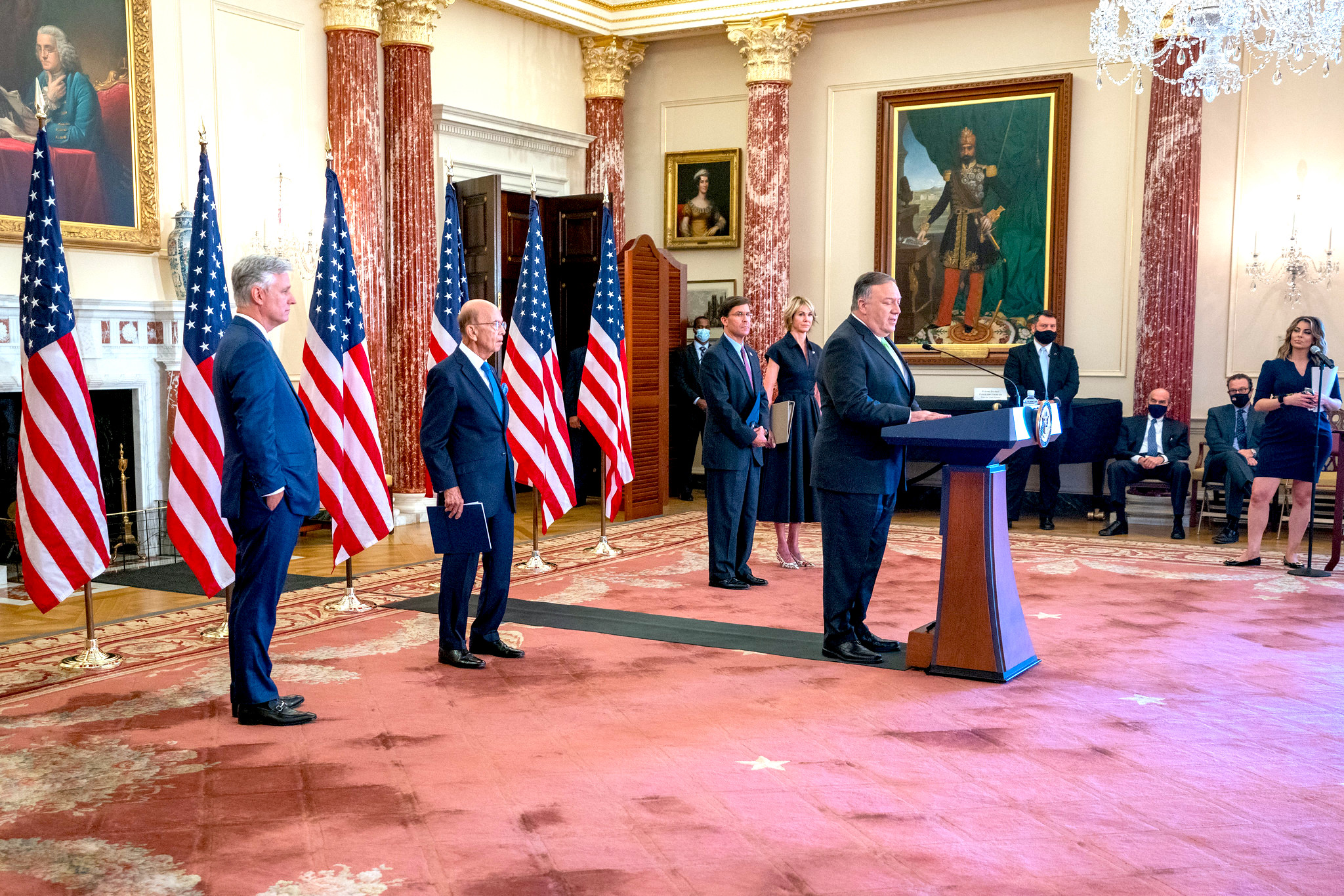
Sept. 21, 2020: U.S. Secretary of State Michael Pompeo delivers remarks on Iran “snapback sanctions” in Washington, D.C. (State Department, Ron Przysucha)
By Juan Cole
TomDispatch.com
 A photo Beijing released on March 6 delivered a seismic shock in Washington.
A photo Beijing released on March 6 delivered a seismic shock in Washington.
There was Wang Yi, a top foreign Chinese foreign affairs official, standing between Ali Shamkhani, the secretary of Iran’s National Security Council, and Saudi National Security Adviser Musaad bin Mohammed al-Aiban. They were awkwardly shaking hands on an agreement to reestablish mutual diplomatic ties.
That picture should have brought to mind a 1993 photo of President Bill Clinton hosting Israeli Prime Minister Yitzhak Rabin and PLO chief Yasser Arafat on the White House lawn as they agreed to the Oslo Accords. And that long-gone moment was itself an after-effect of the air of invincibility the United States had gained in the wake of the collapse of the Soviet Union and the overwhelming American victory in the 1991 Gulf War.
[Related: Seismic Iran-Saudi Rapprochement Isolates US]
This time around, the U.S. had been cut out of the picture, a sea change reflecting not just Chinese initiatives but Washington’s incompetence, arrogance, and double-dealing in the subsequent three decades in the Middle East.
An aftershock came in early May as concerns gripped Congress about the covert construction of a Chinese naval base in the United Arab Emirates, a U.S. ally hosting thousands of American troops. The Abu Dhabi facility would be an add-on to the small base at Djibouti on the east coast of Africa used by the People’s Liberation Army-Navy for combating piracy, evacuating noncombatants from conflict zones, and perhaps regional espionage.
China’s interest in cooling off tensions between the Iranian ayatollahs and the Saudi monarchy arose, however, not from any military ambitions in the region but because it imports significant amounts of oil from both countries. Another impetus was undoubtedly Xi’s ambitious Belt and Road Initiative, or BRI, that aims to expand Eurasia’s overland and maritime economic infrastructure for a vast growth of regional trade — with China, of course, at its heart.
China has already invested billions in a China-Pakistan Economic Corridor and in developing the Pakistani Arabian seaport of Gwadar to facilitate the transmission of Gulf oil to its northwestern provinces.
Having Iran and Saudi Arabia on a war footing endangered Chinese economic interests. Remember that, in September 2019, an Iran proxy or Iran itself launched a drone attack on the massive refinery complex at al-Abqaiq, briefly knocking out 5 million barrels a day of Saudi capacity.
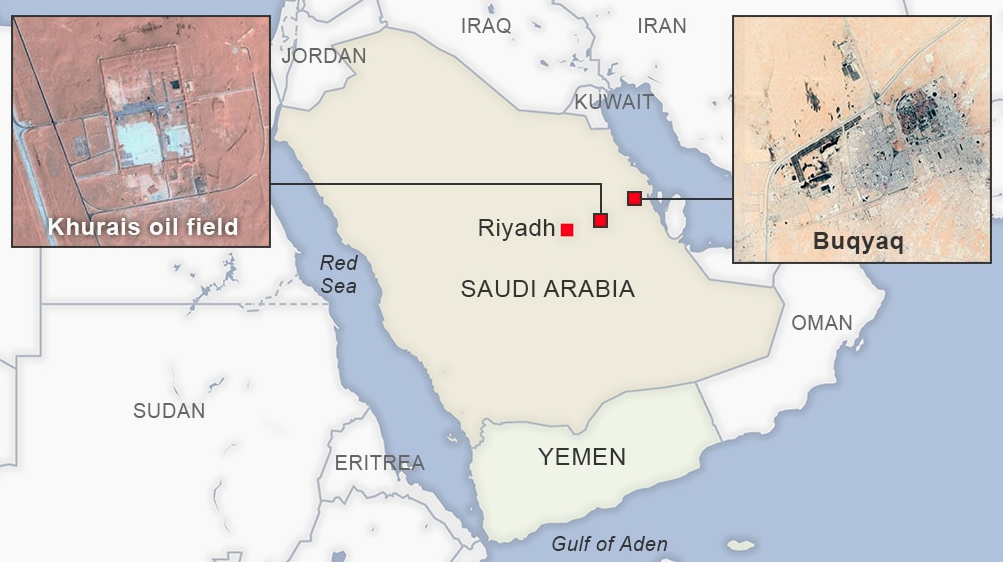
Map and satellite imagery of the Abqaiq — Biqayq in Arabic— and Khurais facilities attacked by drones on Sept. 14, 2019. (VOA, Public domain, Wikimedia Commons)
That country now exports a staggering 1.7 million barrels of petroleum daily to China and future drone strikes (or similar events) threaten those supplies. China is also believed to receive as much as 1.2 million barrels a day from Iran, though it does so surreptitiously because of U.S. sanctions.
In December 2022, when nationwide protests forced the end of Xi’s no-Covid lockdown measures, that country’s appetite for petroleum was once again unleashed, with demand already up 22 percent over 2022.
So, any further instability in the Gulf is the last thing the Chinese Communist Party needs right now. Of course, China is also a global leader in the transition away from petroleum-fueled vehicles, which will eventually make the Middle East far less important to Beijing. That day, however, is still 15 to 30 years away.
Things Could Have Been Different
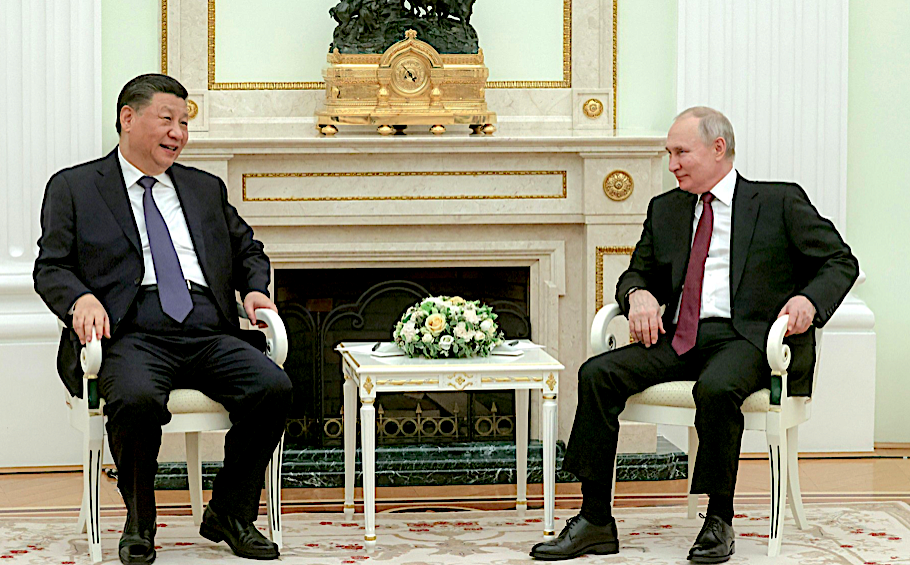
China’s President Xi Jinping with Russian President Vladimir Putin on March 20 in Moscow. (Sergei Karpukhin, TASS)
China’s interest in bringing to an end the Iranian-Saudi cold war, which constantly threatened to turn hotter, is clear enough, but why did those two countries choose such a diplomatic channel?
After all, the United States still styles itself the “indispensable nation.” If that phrase ever had much meaning, however, American indispensability is now visibly in decline, thanks to blunders like allowing Israeli right-wingers to cancel the Oslo peace process, the launching of an illegal invasion of and war in Iraq in 2003 and the grotesque Trumpian mishandling of Iran.
Distant as it may be from Europe, Tehran might nonetheless have been brought into NATO’s sphere of influence, something President Barack Obama spent enormous political capital trying to achieve. Instead, then-President Donald Trump pushed it directly into the arms of Vladimir Putin’s Russian Federation and Xi’s China.
Things could indeed have been different. With the 2015 Joint Comprehensive Plan of Action (JCPOA) nuclear deal, brokered by the Obama administration, all practical pathways for Iran to build nuclear weapons were closed off.
It’s also true that Iran’s ayatollahs have long insisted they don’t want a weapon of mass destruction that, if used, would indiscriminately kill potentially vast numbers of non-combatants, something incompatible with the ethics of Islamic law.
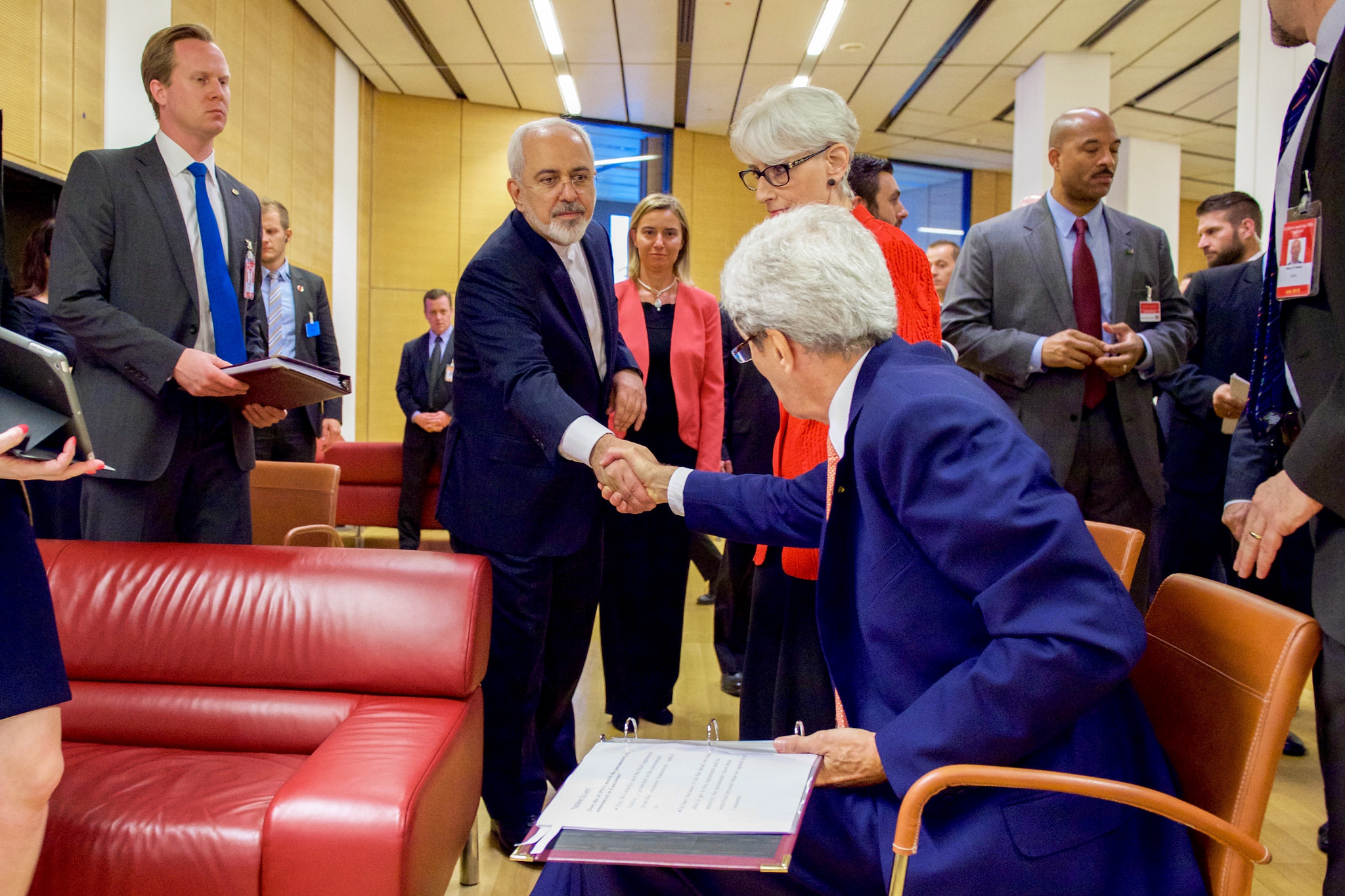
July 14, 2015: U.S. Secretary of State John Kerry, seated, shakes hands in parting with Iranian Foreign Minister Javad Zarif in Vienna after Zarif read a declaration of the nuclear agreement in his native Farsi. (State Department)
Whether one believes that country’s clerical leaders or not, the JCPOA made the question moot, since it imposed severe restrictions on the number of centrifuges Iran could operate, the level to which it could enrich uranium for its nuclear plant at Bushehr, the amount of enriched uranium it could stockpile, and the kinds of nuclear plants it could build.
According to the inspectors at the U.N.’s International Atomic Energy Agency, Iran faithfully implemented its obligations through 2018 and — consider this an irony of our Trumpian times — for such compliance it would be punished by Washington.
Iran’s Ayatollah Ali Khamenei only permitted President Hassan Rouhani to sign that somewhat mortifying treaty with the permanent members of the U.N. Security Council in return for promised relief from Washington’s sanctions (that they never got).
In early 2016, the Security Council did indeed remove its own 2006 sanctions on Iran. That, however, proved a meaningless gesture because by then Congress, deploying the Department of the Treasury’s Office of Foreign Assets Control, had slapped unilateral American sanctions on Iran and, even in the wake of the nuclear deal, congressional Republicans refused to lift them. They even nixed a $25 billion deal that would have allowed Iran to buy civilian passenger jets from Boeing.
Worse yet, such sanctions were designed to punish third parties that contravened them. French firms like Renault and TotalEnergies were eager to jump into the Iranian market but feared reprisals. The U.S. had, after all, fined French bank BNP $8.7 billion for skirting those sanctions and no European corporation wanted a dose of that kind of grief.
In essence, congressional Republicans and the Trump administration kept Iran under such severe sanctions even though it had lived up to its side of the bargain, while Iranian entrepreneurs eagerly looked forward to doing business with Europe and the United States.
In short, Tehran could have been pulled inexorably into the Western orbit via increasing dependence on North Atlantic trade deals, but it was not to be.
And keep in mind that Israeli Prime Minister (then as now) Benjamin Netanyahu had lobbied hard against the JCPOA, even going over Obama’s head in an unprecedented fashion to encourage Congress to nix the deal.
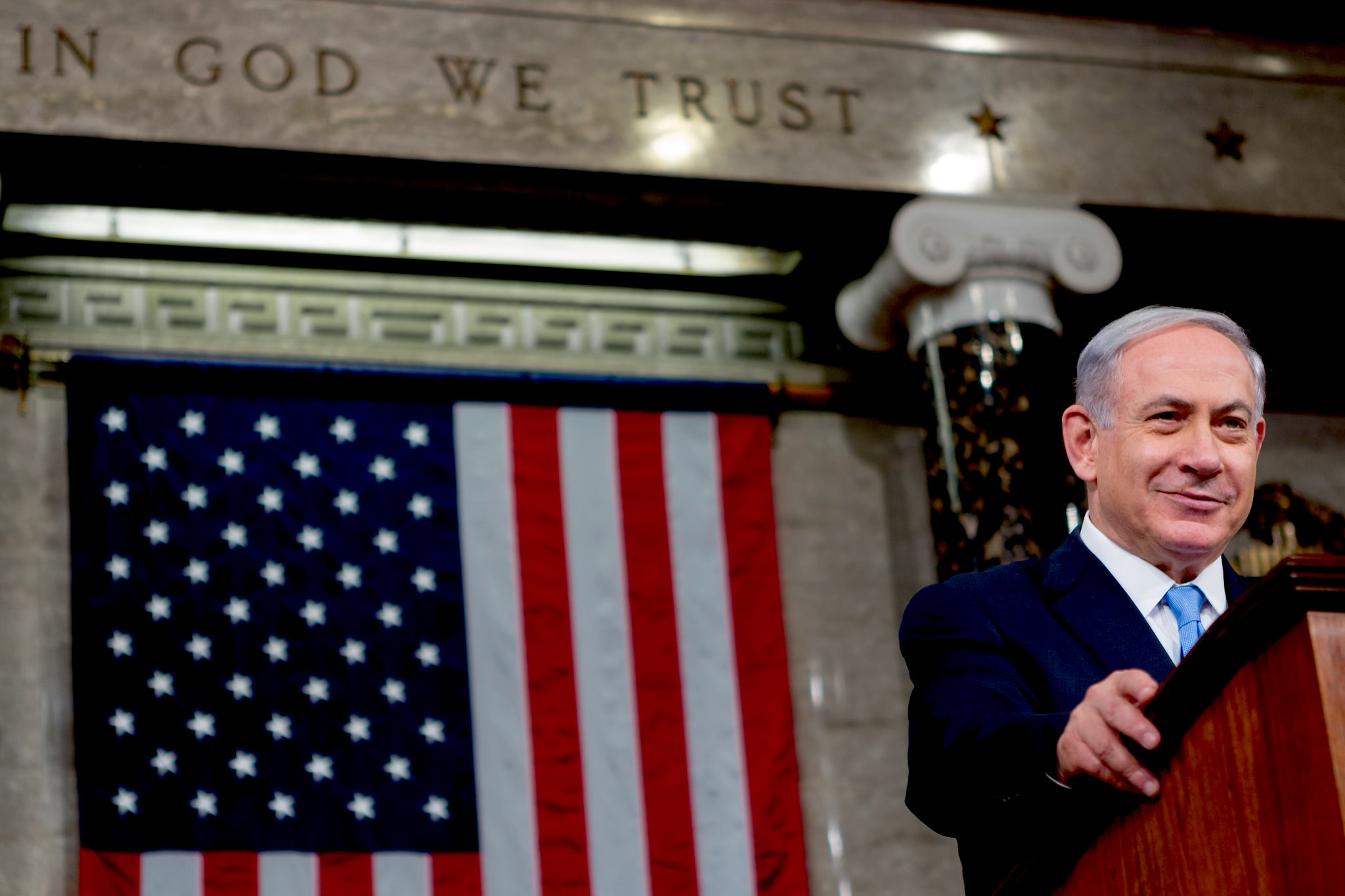
March 3, 2015: Israel’s Prime Minister Benjamin Netanyahu addresses a joint meeting of Congress. (Speaker John Boehner, Flickr, CC BY-NC 2.0)
That effort to play spoiler failed — until, in May 2018, Trump simply tore up the treaty. Netanyahu was caught on tape boasting that he had convinced the gullible Trump to take that step. Although the Israeli right wing insisted that its greatest concern was an Iranian nuclear warhead, it sure didn’t act that way. Sabotaging the 2015 deal actually freed that country from all constraints.
Netanyahu and like-minded Israeli politicians were, it seems, upset that the JCPOA only addressed Iran’s civilian nuclear enrichment program and didn’t mandate a rollback of Iranian influence in Lebanon, Iraq, and Syria, which they apparently believed to be the real threat.
Trump went on to impose what amounted to a financial and trade embargo on Iran. In its wake, trading with that country became an increasingly risky proposition. By May 2019, Trump had succeeded handsomely by his own standards (and those of Netanyahu).
He had managed to reduce Iran’s oil exports from 2.5 million barrels a day to as little as 200,000 barrels a day. That country’s leadership nonetheless continued to conform to the requirements of the JCPOA until mid-2019, after which they began flaunting its provisions. Iran has now produced highly enriched uranium and is much closer to being capable of making nuclear weapons than ever before, though it still has no military nuclear program and the ayatollahs continue to deny that they want such weaponry.
Support CN’s Spring
Fund Drive Today
In reality, Trump’s “maximum pressure campaign” did anything but destroy Tehran’s influence in the region. In fact, if anything, in Lebanon, Syria, and Iraq the power of the ayatollahs was only strengthened.
After a while, Iran also found ways to smuggle its petroleum to China, where it was sold to small private refineries that operated solely for the domestic market. Since those firms had no international presence or assets and didn’t deal in dollars, the Treasury Department had no way of moving against them.
In this fashion, Trump and congressional Republicans ensured that Iran would become deeply dependent on China for its very economic survival — and so also ensured the increasing significance of that rising power in the Middle East.
The Saudi Reversal

Crown Prince of Saudi Arabia Mohammad bin Salman in 2019. (Kremlin)
When Russia invaded Ukraine in February 2022, oil prices spiked, benefiting the Iranian government. The Biden administration then imposed the kind of maximum-pressure sanctions on the Russian Federation that Trump had levied against Iran. Unsurprisingly, a new Axis of the Sanctioned has now formed, with Iran and Russia exploring trade and arms deals and Iran allegedly providing drones to Moscow for its war effort in Ukraine.
As for Saudi Arabia, its de facto leader, Crown Prince Mohammed bin Salman, recently seemed to get a better set of advisers. In March 2015, he had launched a ruinous and devastating war in neighboring Yemen after the Zaydi Shiite “Helpers of God,” or Houthi rebels, took over the populous north of that country.
Since the Saudis were primarily deploying air power against a guerrilla force, their campaign was bound to fail. The Saudi leadership then blamed the rise and resilience of the Houthis on the Iranians. While Iran had indeed provided some money and smuggled some weapons to the Helpers of God, they were a local movement with a long set of grievances against the Saudis. Eight years later, the war has sputtered to a devastating stalemate.
The Saudis had also attempted to counter Iranian influence elsewhere in the Arab world, intervening in the Syrian civil war on the side of fundamentalist Salafi rebels against the government of autocrat Bashar al-Assad.
In 2013, Lebanon’s Shiite Hezbollah militia joined the fray in support of al-Assad and, in 2015, Russia committed air power there to ensure the rebels’ defeat. China had also backed al-Assad (though not militarily) and played a quiet role in the post-war reconstruction of the country.
As part of that recent China-brokered agreement to reduce tensions with Iran and its regional allies, Saudi Arabia just spearheaded a decision to return the al-Assad government to membership in the Arab League (from which it had been expelled in 2011 at the height of the Arab Spring revolts).
By late 2019, in the wake of that drone attack on the Abqaiq refineries, it was already clear that Bin Salman had lost his regional contest with Iran and Saudi Arabia began to seek some way out.
Among other things, the Saudis reached out to the Iraqi prime minister of that moment, Adil Abdel Mahdi, asking for his help as a mediator with the Iranians. He, in turn, invited General Qasem Soleimani, the head of the Jerusalem Brigade of the Iranian Revolutionary Guards Corps, to Baghdad to consider a new relationship with the House of Saud.
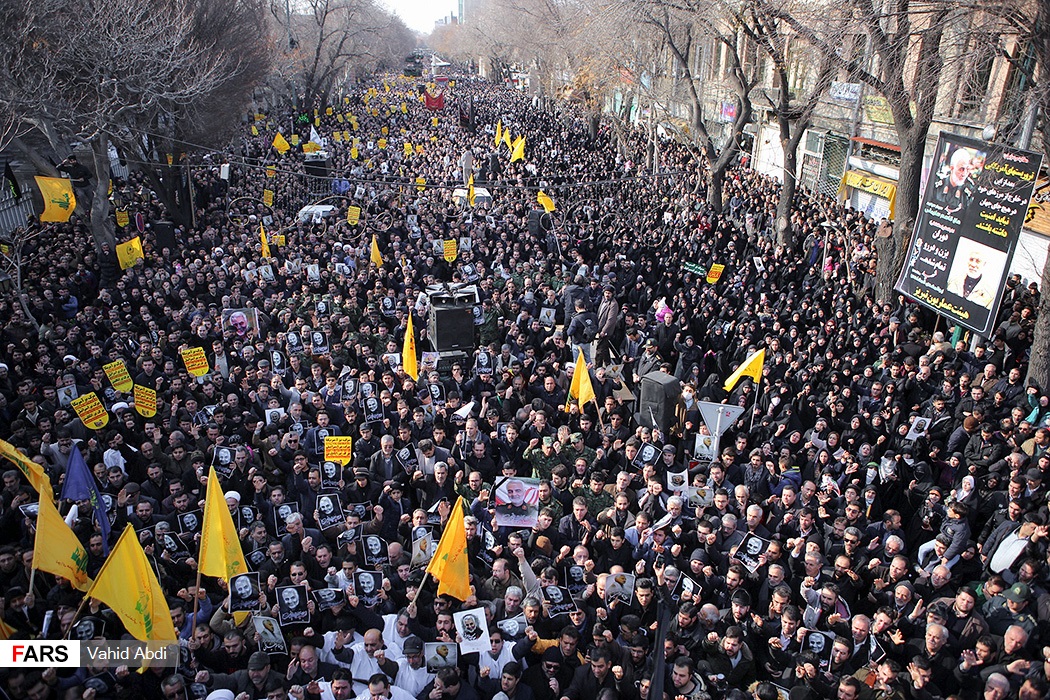
Demonstrations in Iran over the killing of Qassem Soleimani. (Fars News Agency, CC BY 4.0, Wikimedia Commons)
As few will forget, on Jan. 3, 2020, Soleimani flew to Iraq on a civilian airliner only to be assassinated by an American drone strike at Baghdad International Airport on the orders of Trump who claimed he was coming to kill Americans.
Did Trump want to forestall a rapprochement with the Saudis? After all, marshaling that country and other Gulf states into an anti-Iranian alliance with Israel had been at the heart of his son-in-law Jared Kushner’s “Abraham Accords.”
The Rise of China, the Fall of America
Washington is now the skunk at the diplomats’ party. The Iranians were never likely to trust the Americans as mediators. The Saudis must have feared telling them about their negotiations lest the equivalent of another Hellfire missile be unleashed. As 2022 ended, Xi actually visited the Saudi capital Riyadh, where relations with Iran were evidently a topic of conversation.
This February, Iranian President Ebrahim Raisi traveled to Beijing by which time, according to the Chinese Foreign Ministry, Xi had developed a personal commitment to mediating between the two Gulf rivals. Now, a rising China is offering to launch other Middle Eastern mediation efforts, while complaining “that some large countries outside the region” were causing “long-term instability in the Middle East” out of “self-interest.”
China’s new prominence as a peacemaker may soon extend to conflicts like the ones in Yemen and Sudan. As the rising power on this planet with its eye on Eurasia, the Middle East, and Africa, Beijing is clearly eager to have any conflicts that could interfere with its Belt and Road Initiative resolved as peaceably as possible.
Although China is on the cusp of having three aircraft carrier battle groups, they continue to operate close to home and American fears about a Chinese military presence in the Middle East are, so far, without substance.
Where two sides are tired of conflict, as was true with Saudi Arabia and Iran, Beijing is clearly now ready to play the role of the honest broker.
Its remarkable diplomatic feat of restoring relations between those countries, however, reflects less its position as a rising Middle Eastern power than the startling decline of American regional credibility after three decades of false promises (Oslo), debacles (Iraq) and capricious policy-making that, in retrospect, appears to have relied on nothing more substantial than a set of cynical imperial divide-and-rule ploys that are now so been-there, done-that.
Juan Cole, a TomDispatch regular, is the Richard P. Mitchell collegiate professor of history at the University of Michigan. He is the author of The Rubaiyat of Omar Khayyam: A New Translation From the Persian and Muhammad: Prophet of Peace Amid the Clash of Empires. His latest book is Peace Movements in Islam. His award-winning blog is Informed Comment. He is also a non-resident Fellow of the Center for Conflict and Humanitarian Studies in Doha and of Democracy for the Arab World Now (DAWN).
This article is from TomDispatch.com.
The views expressed are solely those of the author and may or may not reflect those of Consortium News.
Support CN’s Spring
Fund Drive Today


“incompetence, arrogance, and double-dealing”
Ah, how nice to recognize the official slogan of the Democratic Party. Now, everyone together in a chant of “Four More Years”.
Both right wings of the Property Party, Sleeping Beauty.
A near excellent dressing down of the “indispensable “super”power”‘s increasingly exposed impotence. Why should the Chinese not smartly capitalize on America’s reckless squandering of its global credibility ? China is merely proving its peaceful rise as a responsible great power.
America seems to have lost its ability to create trust—and to create a functioning government.
It does seem that is the way the world functions. America became the winner for the planet after WW 2—-but that was long ago, and many simply seem to recall that different nations and parts of the world all have a history where each will rise and fall—and truly that no nation remains on top forever.
On the contrary, the majority of the World believed the American hype, that they were allegedly, simply spreading democracy and freedom. It’s too bad, the visible results of those efforts over the years, have proven to be the opposite. With the U.S. constantly blackmailing nations to do it’s bidding, tearing up agreements negotiated with allegedly honour, and basicly rampaging around the World, doing whatever it pleased. It doesn’t take Einstein to work out they are LIARS, DISHONEST, MURDERERS, and to NEVER BE trusted for anything. The World is turning it’s back on the U.S. simply because they can finally see this FACT for themselves, and need to find a better way.
Thank you for your excellent historical essay, Dr. Cole.
Perhaps Middle East leaders are realizing that US Middle East policy is too deeply affected by an absurd apocalyptic ideology, Dispensationalism, which commands the loyalty of tens of millions of US voters.
Juan Cole has reduced the so-called American indispensabilty’s decline to what Obama did versus what Trump did, and to the American so called blunders in general. The US’s many challenges are far more complex than what if the US didn’t do that or did do this. For example, what about an examination of the Obama administration’s so-called solutions to the 2008 financial crisis, and a study of the dominance of finance and the military industrial complex in the US economy?
As for the Iran deal (JCPOA), In truth, if Hillary Clinton were elected to the office instead of Trump the chances are that the US would be where it is now. Even if the Iran deal survived, it would have probably suffered a slow death under Clinton as opposed to sudden death under Trump, as it happened under the Biden administration. This assertion is not far-fetched, as Hillary Clinton was a hawk on the Iran question. It was Hillay Clinton who threatened to nuclear bomb Iran. Moreover, the Iran deal was in trouble from the get go and Iranians were unhappy with the very slow pace of its progress.
Moreover, Whether president Trump kept the Iran deal or not, Iran would not have joined NATO. Iran has never indicated that it has the slightest interest in being part of the western military alliance, if anything it has consistently rejected it.
As for Iran’s pathways being closed off for building nuclear bombs, building nuclear bombs has never been Iran’s intention, not at least for the past many years. Iran has always insisted on its right to development of nuclear technology and specifically to enrichment of uranium, and the Iran deal provided it. That was the main reason why Iran signed the deal.
As much as the world was surprised and even shocked by Trump’s withdrawal from the deal, Iran was not. Right at the start of the nuclear talks, while he supported the Iran US talks on nuclear program, Iran’s supreme leader more than once stated that he was not hopeful that the US would agree to Iran’s right to the development of nuclear technology.
Finally, I believe president Obama realized that Iran’s nuclear expertise had become deep and irreversible. Therefore, by acknowledging that fact he achieved a deal with Iran and this acknowledgement for Iran was a critical factor to enter the agreement. Moreover, the US was in the process of pivoting to Asia, so it needed an agreement with Iran and some calm in West Asia before turning the US attention to East Asia and China.
I would go with 95% of all the points you clarified. Kudos !
Maybe it’s worth recalling what this same author wrote 11 years ago about Libya:
“Iraq was an illegal war, for no pressing national interest & with no UNSC authorization.
The Libya intervention is legal and was necessary to prevent further massacres and to forestall a threat to democratization in Tunisia and Egypt, and if it succeeds in getting rid of Qaddafi’s murderous regime and allowing Libyans to have a normal life, it will be worth the sacrifices in life and treasure. If NATO needs me, I’m there.”
hxxps://www.juancole.com/mideast/arab-world/libya/page/21
Wish I could be a prouder American… but… what sense is shootin myself in the foot like our wardog diplomats?
Most of the major protagonists in these scenarios profess some religious faith. Jesus was a Jew and Muslims and Christians revere his words. So it would be nice if they all remembered ‘do unto others as you would be done by’ and ‘blessed are the peacemakers’.
Wars are about power and wealth, not religion.
Sanctions can be effective if economic alternatives other than the sanctioning power can be eliminated. The response to sanctions, then, is to break off commitments and dependencies that involve the sanctioning power, and to develop alternatives.
Were it easy to do this quickly, it would already be done. Were it not so redundantly obvious that it is essential, it would probably never have been undertaken.
Not that the US is unique in this, but the apparent insanity of its policies derives from a divergence of interests within its ruling class and a divergence of interest between the ruling class, the population, and the nation as a more-or-less integral entity, however that might be conceived. This happens because of the great inequality of wealth, principally, but also because that wealth has both internationalized and capitalized. That is, the money owes less to actual success in the military or the well-being of the USA as a unit, let alone the well being of individual Americans, in part because while it makes real commands, it derives from fictions and abstractions. Businesses that have grown up with and grown out of the neo-imperial black ops management of post-colonial countries after Pottsdam have evolved towards the form of mafia families and international cartels. These have purchased or rented or, I suppose, employed the American government, official by official. Therefore, the perceived vested interest of an American official comes down to what the politician can squirrel out of the boss’s satisfaction.
All this stuff is secret, formally illegal, imposed by networks of blackmail and through cells. It is also grossly ineffective and self-destructive. It sure looks ready to take a lot of us down as it goes.
Welcome to 2024 … where Trump is blamed for Biden’s policies.
The maximum pressure campaign against Iran has been fully adopted by Biden and is now correctly called Biden’s Campaign for Maximum Pressure, as he’s added even more sanctions to Iran and done nothing to reverse Trump’s actions. Instead Biden pushes for Arab-NATO to expand WW3 to Iran. Having been rebuffed by Arabs who don’t want to die to the last Arab for Wall Street, Biden is now wanting to joint-train with Israel for an attack on Iran, but even Netanyahoo is hesitating at actually implementing that insanity.
Meanwhile, Biden is sending armed troops to the border, just like you-know-who. See a pattern? But of course, it is all Trump’s fault. Just keep repeating that. Its all Trump’s fault. Repeat that all the way to 2024.
The halfwits in charge of the West have never understood that unilateral ‘sanctions’ are a single-shot weapon. Well, if not single-shot, then certainly a weapon that declines in effectiveness every time it is used.
This effect is from two causes. 1) People react and adjust. When they see you ‘sanctioning’ one person or country, they think ‘hey, they could do that to us’, and begin to think about how to put their stuff where the world police can’t reach it. Thus, sanctions are then less effective in the future due to this pre-planning resulting from previous sanctions.
And 2), now the USA is creating an entire economy and trade network among the sanctioned nations. If you are sanctioned, now you can trade with Russia, Venezuela and Iran, who can’t get sanctioned any worse, and other independent countries that have already been figuring how to get around the world police in order to conduct their trade. India and China come to mind as at least the latter and partially the former in the case of China.
So, what do the halfwits who run the West do? They make this weapon – that declines with each use – into their primary tool and use it to hit every nail that they can even imagine that they want to hit. Yep, that is their Brilliant Plan for World Domination, which they expected to make Russia collapse to their knees and bring the Yellow Peril begging to them for mercy.
Instead, the world is de-dollarizing in an act of self-defense, which the halfwits don’t seem to realize eliminates their ability to print money without restraint from inflation, which is the sandy foundation on which the halfwits have built their ‘new economy’. These are the strange capitalists that are so committed to monopoly that they have forgotten the law of supply and demand.
The West is ruled by halfwits.
Well said. That said, I think you missed a couple of points. One, all of this is solely in the service of maintaining US Hegemony. Two, the creation of a parallel trade universe is absolutely correct but it is also a parallel universe that is bigger than “The West” which is where the US lives. And, finally, yes, de-dollarizing will cost the US the ability to just print money without much inflation but, more importantly, it will put an end to US sanctions which actually rely on everybody needing dollars, not for a reserve currency, but to close transactions.
BUT. They’ve now come up with another (desperate) idea:
(Bloomberg) — The European Union is discussing a new sanctions mechanism to target third countries it believes aren’t doing enough to prevent Russia from evading sanctions, particularly those that can’t explain spikes in trade of key goods or technologies, according to people familiar with the matter.
May 4th.